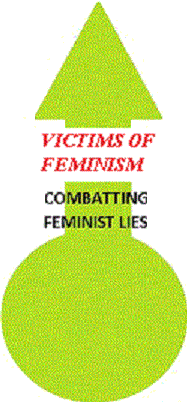Home > Issues > The Totalitarianisation of the Judiciary > Reforming the Institute of Judicial Studies |
||||||||||

|
Empowering Men:fighting feminist lies |
|||||||||
Reforming the Institute of Judicial Studies© Peter Zohrab 2009 |
||||||||||
Home > Issues > The Totalitarianisation of the Judiciary > Reforming the Institute of Judicial Studies |
||||||||||

|
Empowering Men:fighting feminist lies |
|||||||||
Reforming the Institute of Judicial Studies© Peter Zohrab 2009 |
||||||||||
(Open Letter to the Attorney-General, Minister of Justice, Minister for Courts, and Associate Minister of Justice)
Dear Mrs. Te Heuheu, Mr. Power, Mr. Finlayson and Dr. Worth,
A report in the New Zealand Herald (http://www.nzherald.co.nz/nz/news/article.cfm?c_id=1&objectid=10566651) quoted an American Feminist as saying that, in New Zealand,:
"... the Ministry of Justice ... refused to require judges to undergo family violence training because it would undermine "judicial independence".
In that context, I would like to bring to your attention, and ask you to comment on, the constitutional status and constitutional implications of the existence and activities of the Institute of Judicial Studies – particularly in relation to its teaching judicial officers material that goes under the heading of so-called "Gender Equity", which I have reason to believe includes material on (for example) family violence which is slanted in an anti-male direction. You will of course be aware that simply assuming that women are disadvantaged (in any sector of society), and then giving them the funding and access to power to enable them to prove it, simply results in the apparent justification of the initial assumption, since men's advocates have never been given a hearing. The Natural Justice principle involved here is Audi Alteram Partem.
I have recently made a (renewed) request to make a presentation to judicial officers on the topic of Gender Equity, in order to balance the anti-male presentations which the Institute of Judicial Studies has arranged on this topic. I then received from the Institute of Judicial Studies a two-line letter, which simply stated that they "currently have no plans" to conduct a seminar on Gender Equity. There appear to be no Democratic constraints on the Institute of Judicial Studies' power to start, stop, and then to restart series of seminars which are designed to inculcate in judicial officers a set of beliefs on social policy matters. How can lawyers in Court adequately represent their clients if and when they need to pursue a line of argument which has been argued against in private to the judge hearing the case, in the context of a judicial education seminar?
My Communication to the Human Rights Committee under Optional Protocol to the International Covenant on Civil and Political Rights, shows how I have been trying for some time both to investigate and to participate in the activities of the Institute of Judicial Studies with respect to their notion of Gender Equity. I received a favourable ruling as to his jurisdiction from a former Chief Ombudsman, which allowed me to find out the names of people who had given presentations to judicial officers on Gender Equity. A later Chief Ombudsman reversed that decision, denying me the opportunity of finding out what actual material had been presented to judicial officers about Gender Equity – short of taking the Chief Ombudsman to court.
More recently, I have come across a copy of the materials presented to judicial officers in the course of the Judicial Seminar on Gender Equity, which was held at Rotorua in May 1997, and which was a forerunner to the creation of the Gender Equity programme of the Institute of Judicial Studies. What I found outrageous about these materials – apart from their one-sided and propagandistic nature – was the fact that they hardly mentioned the term Gender Equity, and did not define it. In other words, the materials were nothing more than a grab-bag of topics that some Feminists felt like brainwashing our judges about. The topics ranged from the meta-theoretical through the theoretical to the substantive. What I mean by that is that there was a presentation on how difficult it was to prove gender bias, presentations on gender bias in the law and society in general, and presentations on the substantive issue of Domestic Violence.
My understanding of the New Zealand Constitution is that there are three branches of Government: the Executive, the Legislature and the Judiciary. I would also suggest including the media, the unions and the education system as branches of Government, but I will leave that point aside in the current context. The function of the judiciary is to decide cases which are brought before judicial officers. Issues of substantive policy are the preserve of the Executive and Parliament, which are under democratic control. Education is also the preserve of the Executive and Parliament.
No doubt it would be argued that for the Executive and Parliament to control the education of judicial officers would undermine the independence of the Judiciary. However, no matter who controls the education of judicial officers, there is scope for capture by particular ideological tendencies, such as simplistic Feminism, as has indeed already occurred. At least the Executive and Parliament are under democratic control, and clearly subject to the Official Information Act. The Institute of Judicial Studies, on the other hand, has been fighting tooth and nail to keep secret the ideological brainwashing which it clearly has been subjecting judicial officers to. This not only undermines the independence of the judiciary but also strikes at the heart of the Democratic principles which underlie our Constitution.
As I see it, there are four options here:
My preference would be for the fourth option. I look forward very much to receiving your comments on the issues I have raised above.
| |
|||||||||
|
|||||||||
Top |